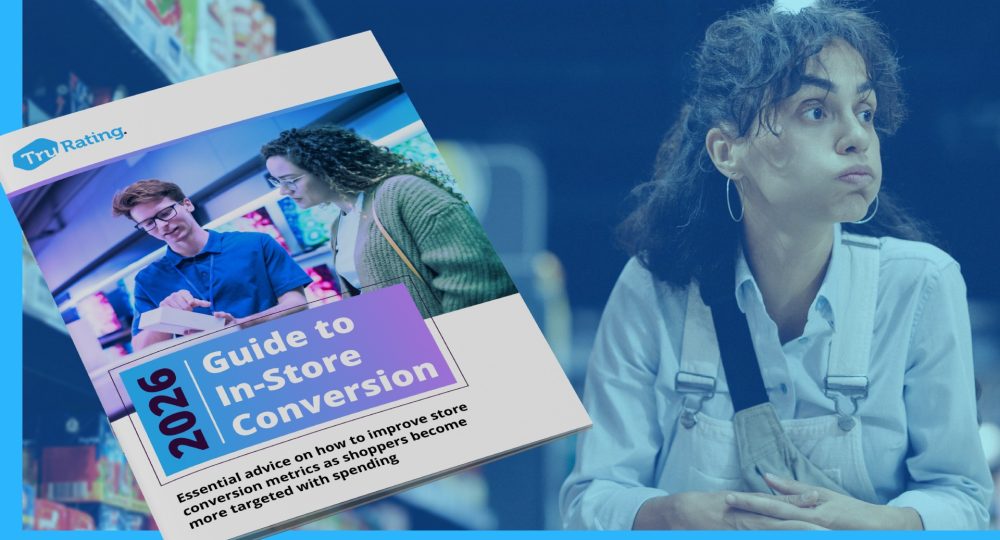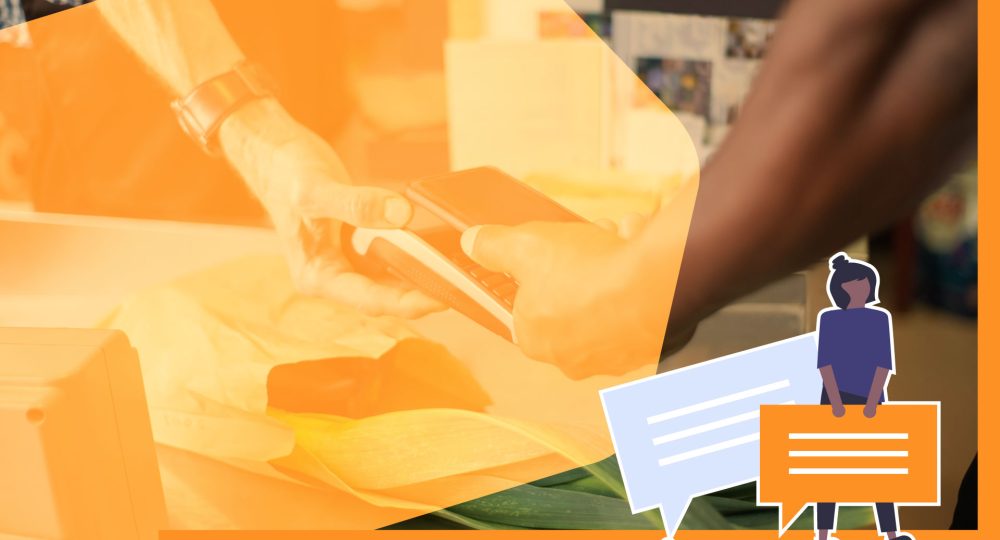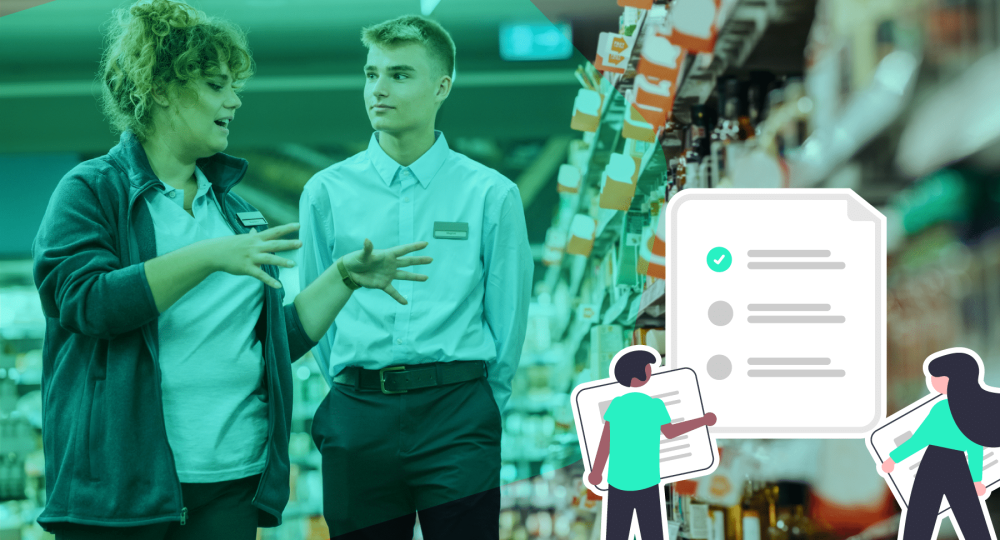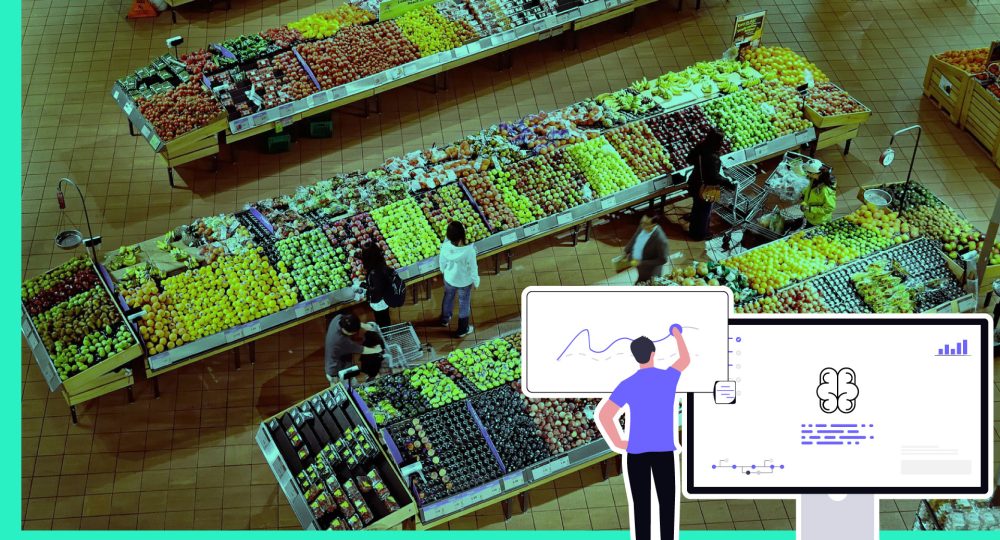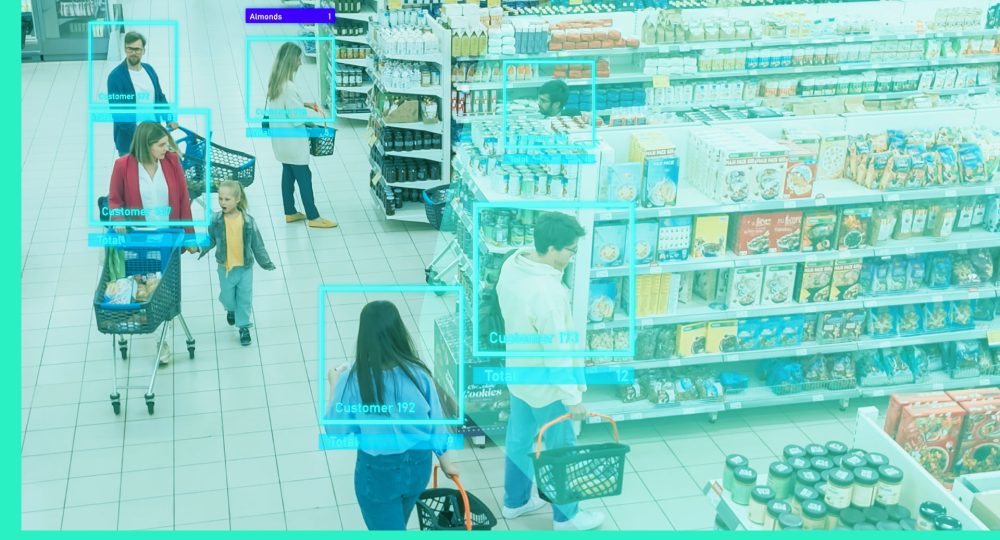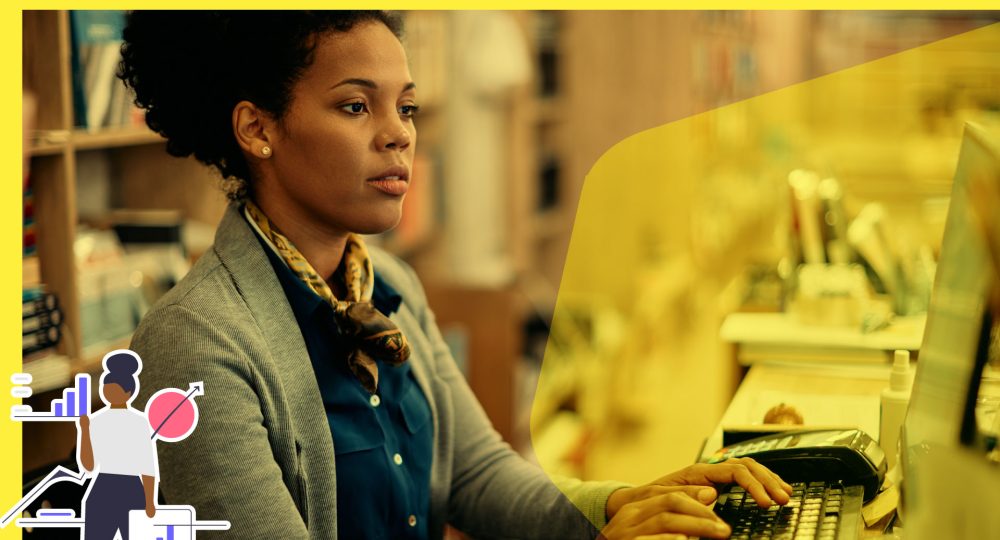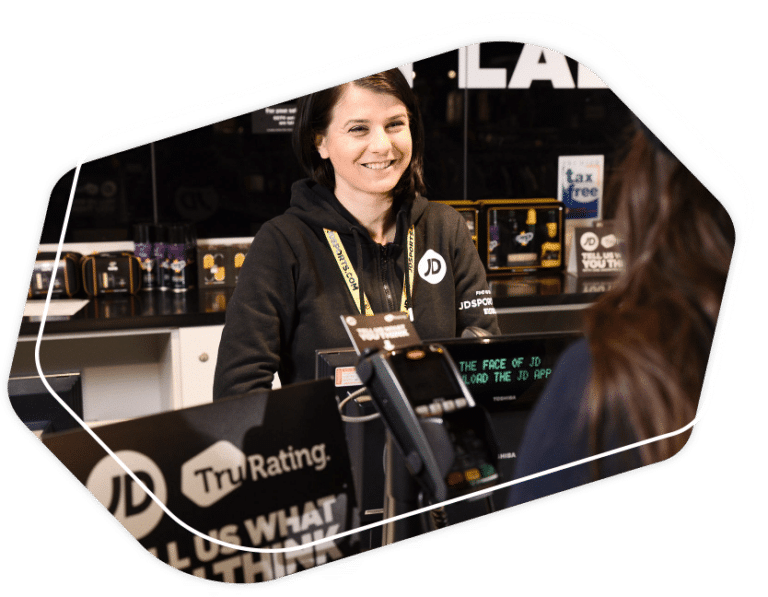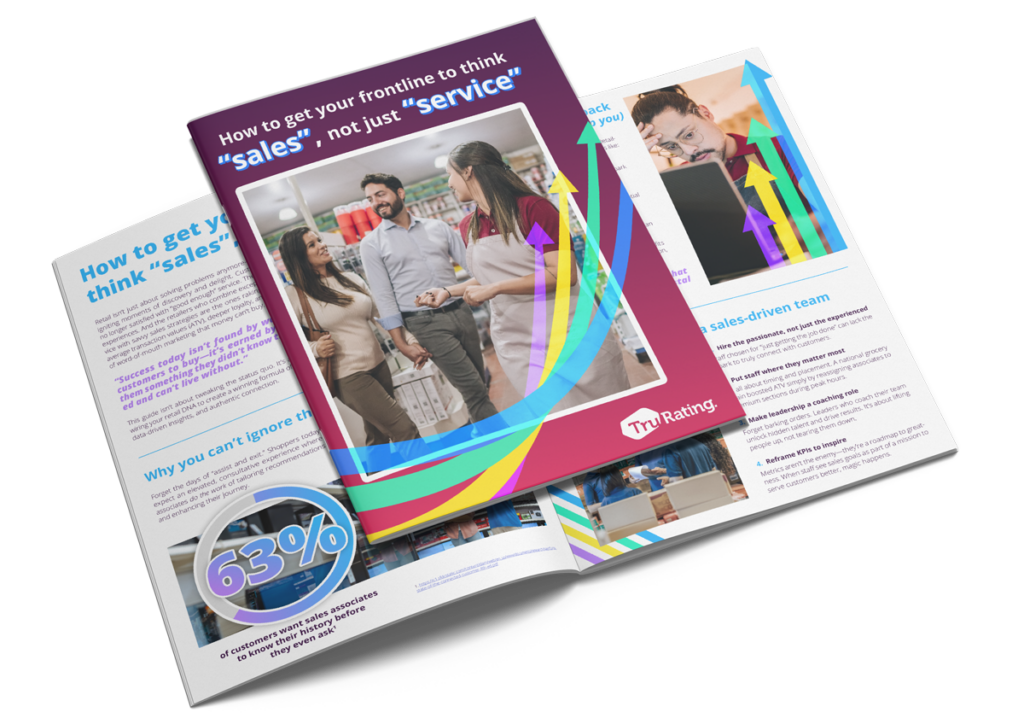COVID hit retail like a seismic shockwave in March 2020. While much of that year saw the industry scramble to meet consumers’ immediate needs and concerns, the question many are asking themselves now is – what is next?
Although we may have survived the first wave of lockdowns and store closures, the ripple effect of the pandemic is actively being played out before our eyes.
In the run-up to the busiest trading time of the year—with Black Friday, Cyber Monday, and the Holiday Season all on the close horizon—we are seeing new struggles emerge. Labour shortages, supply chain impacts and ongoing uncertainty in the face of a pandemic that while contained, is by no means over.
At this point in time, the question of ‘Loyalty’ is one that seems ripe for investigation. While consumers showed their willingness to step up and support the businesses they loved—and those who were able to step up in a moment of crisis—we are potentially about to enter
a difficult period for retail. As businesses and consumers face new challenges, how much will that loyalty be tested?
This report is an initial attempt to get under the hood of the retail landscape and to set some initial pointers for what is coming in the months and even years ahead. Are customers seeking a new type of connection with retailers? And are we seeing a more emotionally-driven consumer base following the pandemic?
We asked…
- Have the brands you bought changed due to COVID?
- Do you feel an emotional connection towards your favorite brands?
- Are you more loyal to your favorite brands since COVID?
- Do you consider a brand’s values before purchasing?
- Do loyalty programs influence where you shop?
- Would one bad experience stop you shopping with a brand?
The data here is not intended to provide definitive answers to these tough questions but looks to set the groundwork for an ongoing interrogation of evolving consumer values into 2022 and beyond.
We hope this report provides a safe vantage point from which to navigate the choppy waters ahead.
To download a PDF of this report just submit your contact details below or carry on reading below for the view in full right now.
Over a quarter of consumers have changed the brands they buy due to COVID
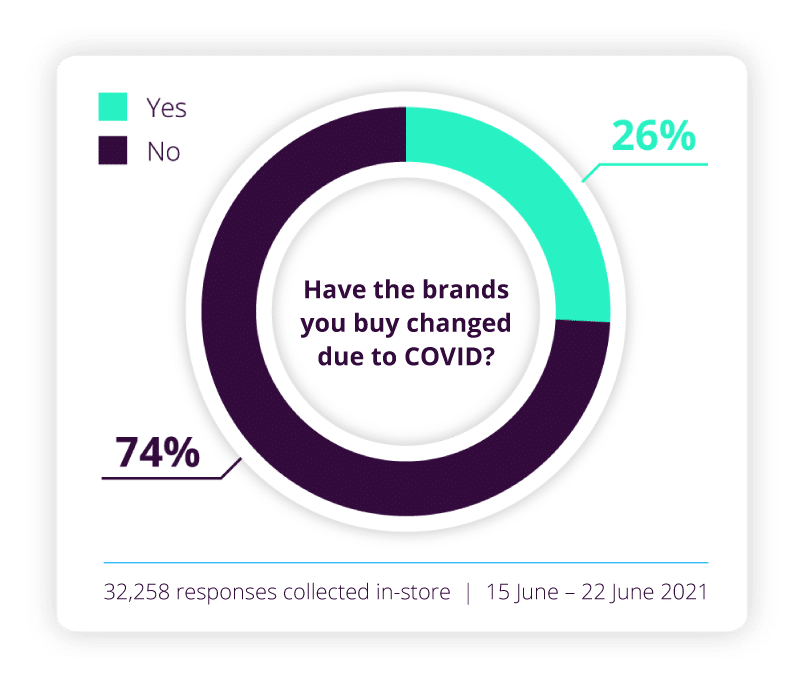
26% of consumers have changed the brands they buy because of COVID. The reality of this can be seen most markedly in the day-to-day essential purchases we all make. For both retailers and brands, the real question is how to safeguard against this new willingness to experiment – what separates loyalty from habit in the ‘new normal’?
68% of shoppers are more loyal to their favourite brands since COVID
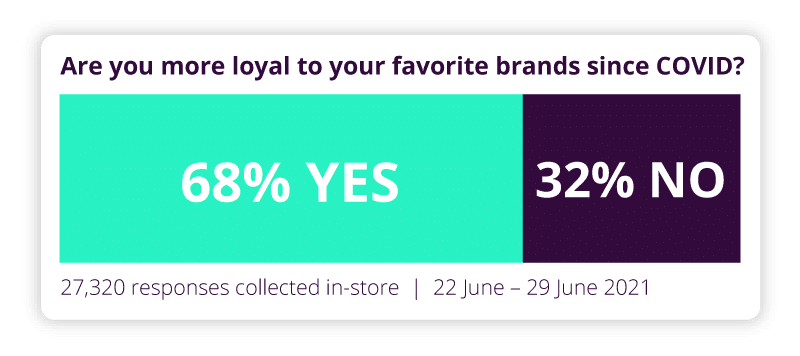
At the outbreak of the pandemic, we saw this play out in an upswing of consumer support for well-loved and vulnerable local establishments and independent businesses. But how do larger retailers ensure similar levels of loyalty and commitment? And how do businesses ensure the currency of good faith remains strong in the light of potential future disruptions?
60% of shoppers feel an emotional connection to their favourite brand
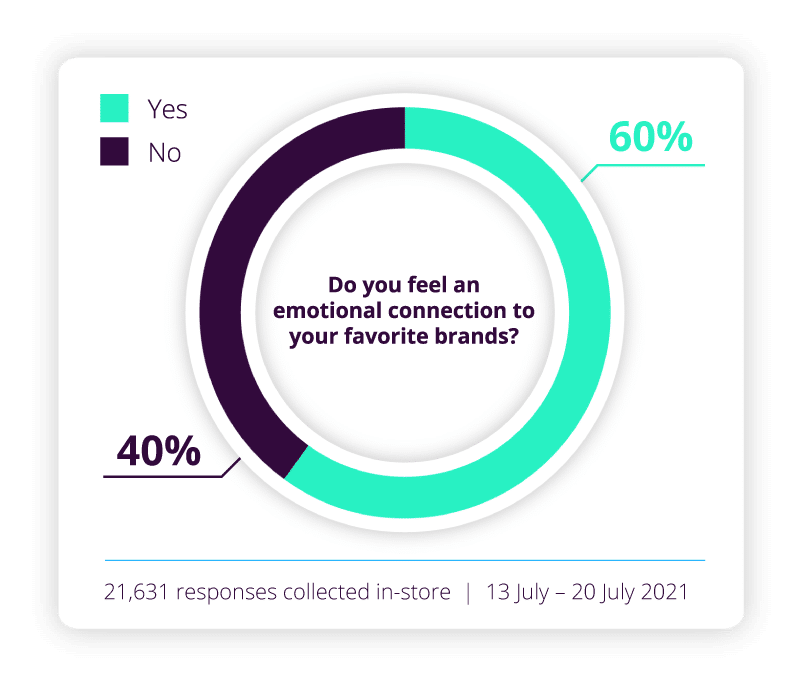
What truly makes a customer choose your brand over another? Produce, price, and placement all have their place, however, meeting your customers’ emotional needs is an intentional process. It has long been suggested that emotional connection is important to brand success. Our data aligns with that sentiment.
77% of consumers consider brand values before purchasing while just 54% consumers are influenced by loyalty programs
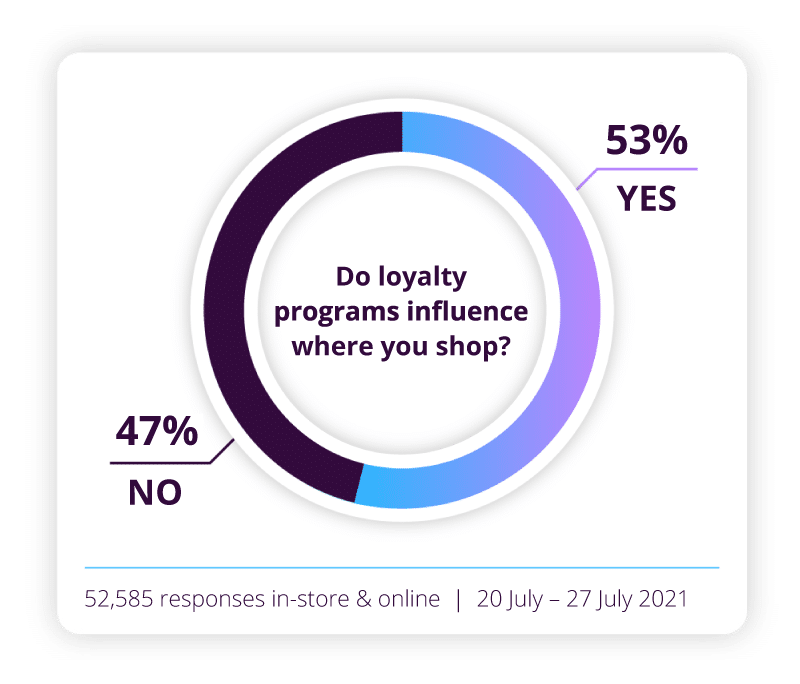
An incredible 77% of customers now consider a brand’s values before making a purchase.
Suppose anyone needed further proof that loyalty programs are not a silver bullet solution, just 54% of consumers report that such programs influence their shopping habits today. The question remains – will this sense of emotional or ethical affiliation be a strong enough guardrail to ward off the negative impacts of future COVID-related disruptions?
A State-by-State View: Emotional Connection & Loyalty
While initially the ‘conscientious consumer’ may have been seen as a Millennial and Gen-Z trend – when we map responses by state, we see two interesting points emerge.
- There is a strong correlation between the importance placed on emotional connection and on loyalty during COVID.
- This distribution is not spread evenly across the United States.
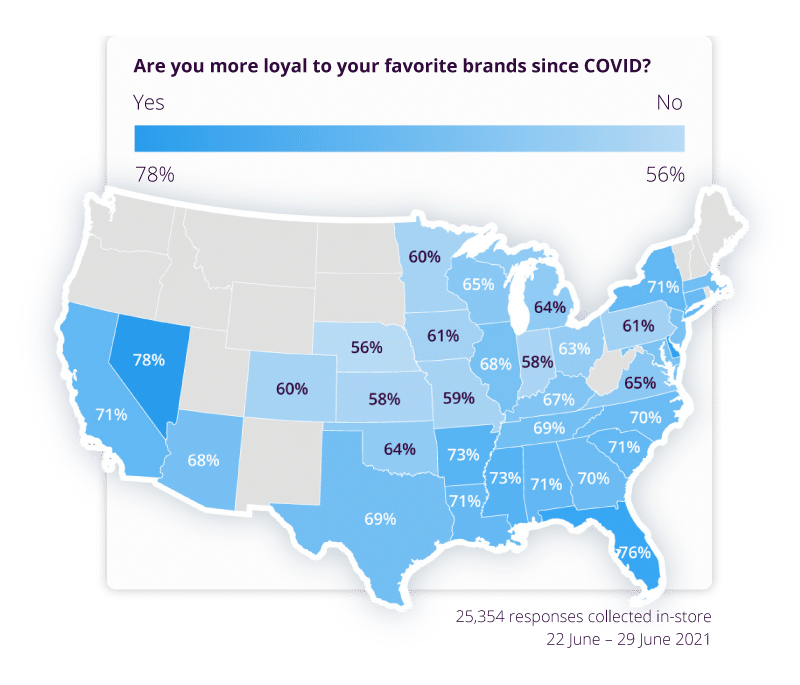
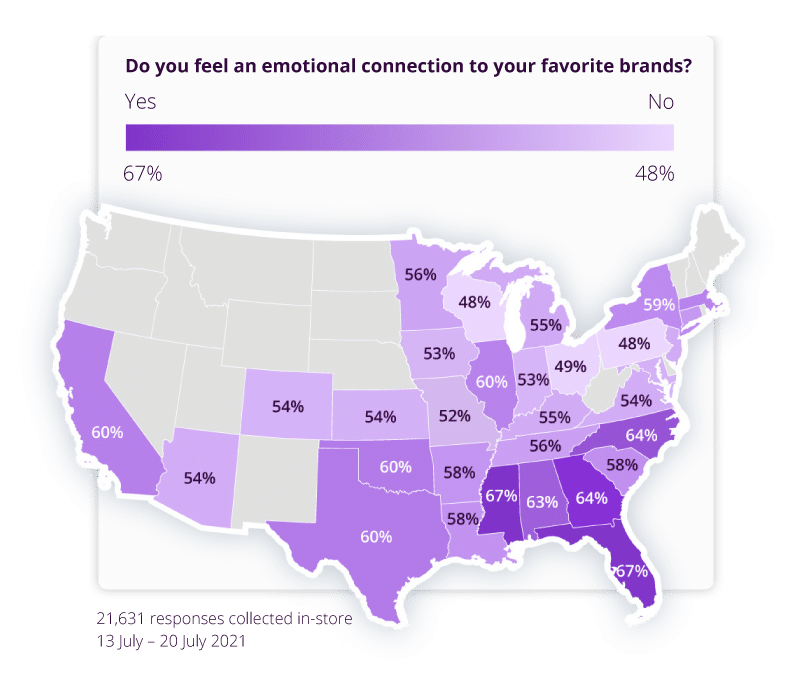
*NB coverage of partaking retailers did not include the NW in this sample, but will be extended for future reports.
44% of consumers say a single bad shopping experience will stop them from shopping with a brand
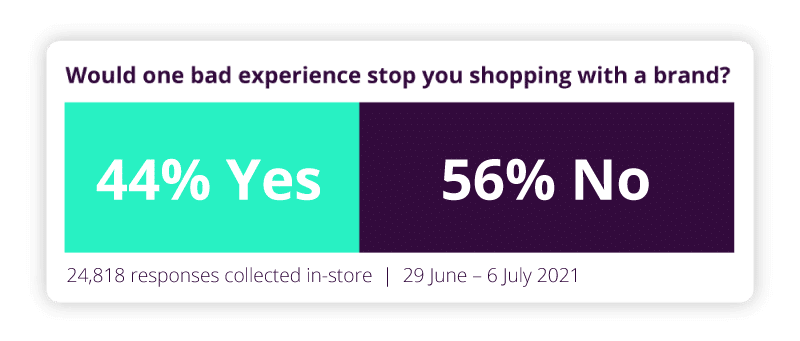
The ultimate test of emotional loyalty is to what extent customers will forgive the brands they love when things do not go as planned. The months ahead will be a true test of the buffering impact of brand love and emotional connection as the longer-term impacts of the pandemic are felt through impacts to the supply chain and labour supplies.
The Tru View
Most loyalty metrics used by retailers over the last 20 years have been based on measuring historic transactions. Recency, frequency, and value, maybe estimated share of wallet in advanced cases. Meanwhile, the benefits to consumers have been reduced to a contractual exchange. Some form of discount in return for a set level of spend or personal data. Maybe occasionally (for those with enough data and product differentiation) a limited set of personalized offers.
The problem is these approaches don’t distinguish customer habit from customer loyalty – and they certainly don’t build loyalty that will stand the test of time for the future.
When a big, long-lasting, and external shock to the system like Covid comes along – it should have come as no surprise that a forced change revealed the cracks in our sense of loyalty to many retailers. The pandemic revealed that we all want and need strong emotional human connections – and we’re willing to support the businesses that can foster those trusted relationships.
So how do you do it? Like any relationship, it’s built on the basics of trust and reliability. Consumers don’t expect perfection, but they will remember it if you try to hide it or fail to put things right when something bad does happen.
At a fundamental level – it’s about being authentic and human. Show empathy to your staff and customers, make moves to keep them safe. Stand up and live by your values – be it sustainability, education or equality – and make sure you’re aligned with your customers. The last 18 months have been challenging – but the opportunity to build stronger, more loyal customers is certainly there.
Ask the Experts
Amid COVID, loyalty marketing is evolving beyond incentivizing shoppers to spend by racking up points they cash in for free items or discounts.
Rewards programs are becoming more experiential, as retailers and brands are becoming less literal-minded about the notion of loyalty, to forge deeper bonds with shoppers that aim to go beyond the transactional.
We see retailers from Sephora to Walmart courting consumers’ loyalty in new ways, from deepening emotional bonds with shoppers to heightening conveniences for them.
Walmart is doing it with its new Walmart+ subscription loyalty program, which is built around services, like home delivery and a scan and go feature via its mobile app, so shoppers can skip the checkout line.
And as consumers vote with their wallets for brands that reflect their values and belief systems, retailers are increasingly tying those values to their loyalty programs.
For example, last year amid the killing of George Floyd, the Black Lives Matter movement and the spotlight on racial injustice, Sephora allowed its Beauty Insider members to use their rewards points to donate to the National Black Justice Coalition, enabling its core consumer to put its money where its hearts and minds were via purchases at the retailer.
Barbara Thau, Senior Featured Editor, CO— by U.S. Chamber of Commerce
Loyalty is earned, and how brands supported consumers during the pandemic will certainly play a role in their interest to continue to support them or not. The reality is, customers gained new perspectives on how to shop, what they needed and ways in which they preferred to engage with retailers throughout COVID and even beyond as the world slowly opened up. Likewise, however, retailers repositioned their own efforts to connect and support consumers during the pandemic and as a result, loyalty should be evaluated, as well. More so than ever, trust is a heightened priority among consumers and brands and as a result, loyalty programs and how merchants reward customer loyalty should be a top priority as well.
Nicole Leinbach Reyhle, Founder, Retail Minded
There are three standout points from this survey that should cause retailers and brands to rethink their approach to loyalty. First, 60% of in-store shoppers feel an emotional connection to their favourite brands. This reinforces why brick & mortar stores matter – the ability to experience the product in some way establishes a bond that simply making a convenient purchase online cannot replicate.
Second, a brand’s values matter more than ever – 77% of shoppers said they consider a brand’s values before making a purchase. Consumers care about social issues, and they want their favourite brands to care, too.
Third, when 44% of shoppers say a single “bad brand experience” would cause them to stop buying from
a brand, retailers need to step up their customer experience and support. Consumers learned during the pandemic it’s not so hard to switch brands even with their favourite products. The willingness to switch no longer carries a pain point for nearly half of shoppers. That’s something for retailers to understand!
Ricardo Belmar, Retail Transformation Thought Leader & Founder, Retail Razor Advisory
Consumers have so many choices these days; anything you want them to embrace better be good – it’s the classic “What’s in it for me?”
We have all been asked at checkout if we belong to the store’s loyalty program and we can’t remember if we do or not. If it had value, we would remember, but too many loyalty programs take too long to accumulate rewards and consumers lose interest.
If a loyalty program isn’t simple to understand, and points aren’t easy to accumulate and redeem, why bother? DSW gets it: Points for everything, free shipping, birthday perks and more. There’s value their shoppers can immediately see. And when it comes to loyalty programs, immediately is key.
Kizer & Bender, Consumer Anthropologists and Retail Consultants, Kizer & Bender
Customers may be more loyal to their favourite brands after the first bout of COVID, but their favourite brands have changed. Most customers scrutinized brands’ actions during the pandemic and surrounding social justice movements. It’s the brands that were able to show that they had values similar to their core customer base through their actions during the pandemic that will continue to resonate in 2021.
Jasmine Glasheen, Principal Writer & CEO, Jasmine Glasheen & Associates
As the pandemic has accelerated digital adoption throughout the customer journey, a wealth of new data points must be integrated to further personalize and build loyalty.
Carl Boutet, Chief Strategist & Executive Advisor, Studio RX
To download a PDF version of the report you’ve just read, just enter your details below and we’ll deliver it straight to your inbox.
For more like the above check out our previous consumer insights reports below:


